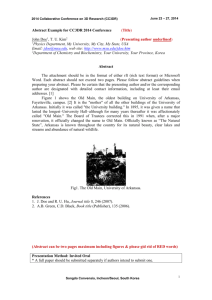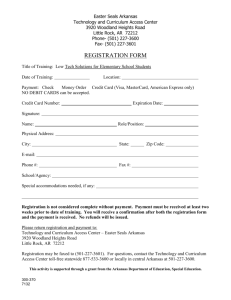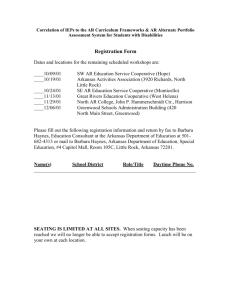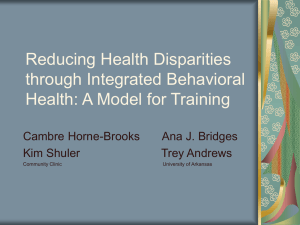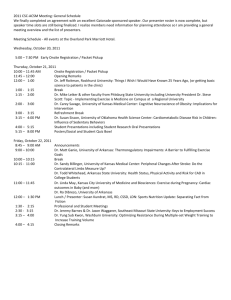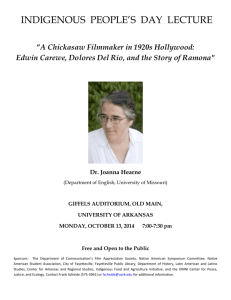Conference agenda:
advertisement
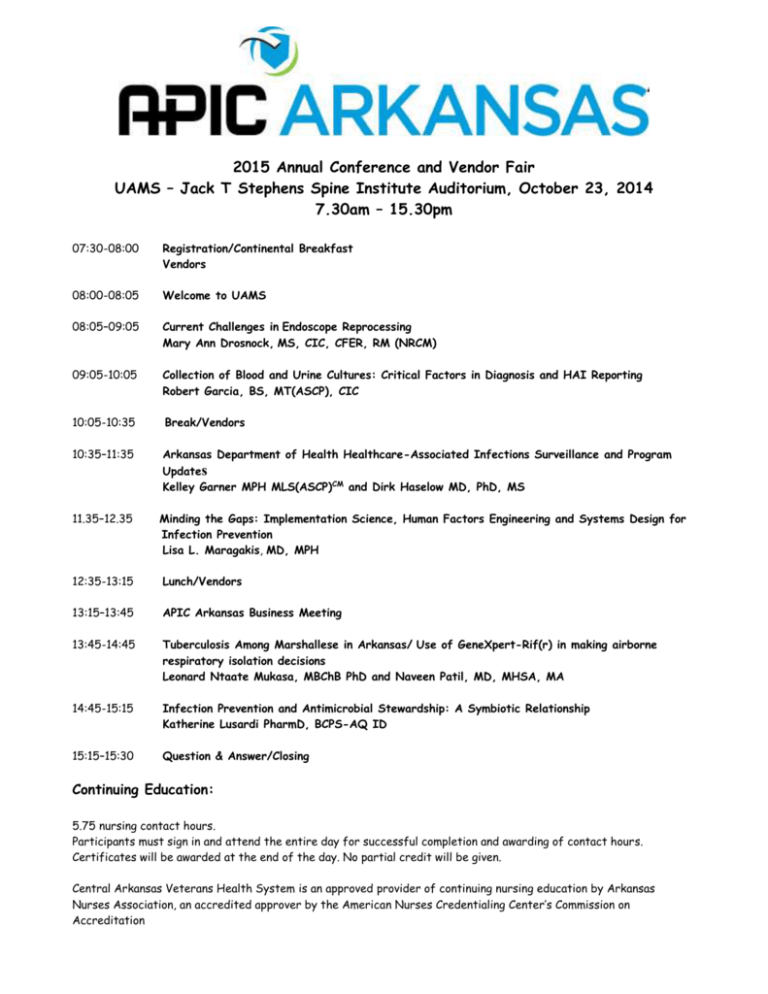
2015 Annual Conference and Vendor Fair UAMS – Jack T Stephens Spine Institute Auditorium, October 23, 2014 7.30am – 15.30pm 07:30-08:00 Registration/Continental Breakfast Vendors 08:00-08:05 Welcome to UAMS 08:05–09:05 Current Challenges in Endoscope Reprocessing Mary Ann Drosnock, MS, CIC, CFER, RM (NRCM) 09:05-10:05 Collection of Blood and Urine Cultures: Critical Factors in Diagnosis and HAI Reporting Robert Garcia, BS, MT(ASCP), CIC 10:05-10:35 Break/Vendors 10:35–11:35 Arkansas Department of Health Healthcare-Associated Infections Surveillance and Program Updates Kelley Garner MPH MLS(ASCP)CM and Dirk Haselow MD, PhD, MS 11.35–12.35 Minding the Gaps: Implementation Science, Human Factors Engineering and Systems Design for Infection Prevention Lisa L. Maragakis, MD, MPH 12:35-13:15 Lunch/Vendors 13:15–13:45 APIC Arkansas Business Meeting 13:45-14:45 Tuberculosis Among Marshallese in Arkansas/ Use of GeneXpert-Rif(r) in making airborne respiratory isolation decisions Leonard Ntaate Mukasa, MBChB PhD and Naveen Patil, MD, MHSA, MA 14:45-15:15 Infection Prevention and Antimicrobial Stewardship: A Symbiotic Relationship Katherine Lusardi PharmD, BCPS-AQ ID 15:15–15:30 Question & Answer/Closing Continuing Education: 5.75 nursing contact hours. Participants must sign in and attend the entire day for successful completion and awarding of contact hours. Certificates will be awarded at the end of the day. No partial credit will be given. Central Arkansas Veterans Health System is an approved provider of continuing nursing education by Arkansas Nurses Association, an accredited approver by the American Nurses Credentialing Center’s Commission on Accreditation Faculty Mary Ann Drosnock, MS, CIC, CFER, RM (NRCM) Manager, Clinical Education for Gastroenterology Healthmark Industries Topic: Current Challenges in Endoscope Reprocessing (1 hour) Objectives: 1. To understand endoscope reprocessing procedures & challenges 2. To identify best practices in reprocessing of flexible endoscopes 3. To understand how to determine if an endoscope is patient ready 4. Review and understand the following: Current guidelines, published literature and recommendations An overview of the anatomy of flexible scopes The evidence-based clinical relevant products on monitoring flexible endoscopes Robert Garcia, BS, MT(ASCP), CIC Infection Preventionist Stony Brook University Medical Center, Greater New York City Area Topic: Collection of Blood and Urine Cultures: Critical Factors in Diagnosis and HAI Reporting (1 hour) Objectives: Pending Kelley Garner MPH MLS(ASCP)CM and Dirk Haselow MD, PhD, MS Arkansas Department of Health Topic: Arkansas Department of Health Healthcare-Associated Infections Surveillance and Program Updates (1 hour) Objectives: 1. Present current state and national Healthcare-Associated Infections (HAI) data collected 2. Provide an overview of current and future HAI Program activities as they relate to general infection prevention and Ebola. Lisa L. Maragakis, MD, MPH Associate Professor of Medicine, Division of Infectious Diseases, Johns Hopkins University School of Medicine. Senior Director of Healthcare Epidemiology and Infection Prevention, The Johns Hopkins Health System Topic: Minding the Gaps: Implementation Science, Human Factors Engineering and Systems Design for Infection Prevention (1 hour) Objectives: 1. Explain how the recent Ebola crisis highlighted some important knowledge and evidence gaps in infection prevention. 2. Discuss how trans-disciplinary teams can help address these gaps and bring new perspectives and approaches to infection prevention. 3. Describe how implementation science can help to inform and augment our infection prevention interventions. Leonard Ntaate Mukasa, MBChB PhD and Naveen Patil, MD, MHSA, MA Arkansas Department of Health Topic: Tuberculosis Among Marshallese in Arkansas/ Use of GeneXpert-Rif(r) in making airborne respiratory isolation decisions (1 hour) Objectives: 1. Marshallese in Arkansas. A historical perspective 2. The challenge of tuberculosis prevention and care in the Marshallese; features of transmission and reactivation in this population 3. Plan of ADH to address challenges 4. How GeneXpert can revolutionize airborne isolation principle in tuberculosis 5. Access to GeneXpert technology at Arkansas State Tuberculosis Laboratory Katherine Lusardi PharmD, BCPS-AQ ID Clinical Specialist, Antimicrobial Stewardship, UAMS Medical Center Topic: Infection Prevention and Antimicrobial Stewardship: A Symbiotic Relationship (0.5 hour) Objectives: 1. Describe the goals of antimicrobial stewardship and the strategies recommended to accomplish these. 2. Identify opportunities where infection prevention and stewardship can work together towards common goals.

